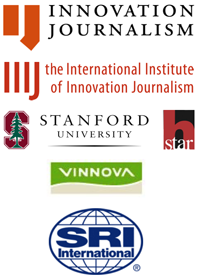Innovation, anyone? R&D? University funding?
As sure as the presidential election won't be about foxhunting, it won't be about science and technology.
"We've sort of resigned to the fact that America is a funny country," says Woody Powell, professor at Stanford University and editor of the journal "Research Policy."
It sure is funny - or at least weird - that an industry spending way over $300 billion a year gets less attention than if a superdelegate decides to use the bathroom in the Clinton mansion.
But contrary to popular belief, it's not all the media's fault.
"The scientific community has very few spokespersons on the national level," Powell goes on. "Perhaps it's because we're reluctant to talk out loud about how dependent we are on foreigners at the moment. A lot of people wouldn't like that."
Another reason is that most universities hesitate when it comes to openly embracing the gritty rules of politics.
"We are supposed to be Eiffel towers," Powell says. "Eiffel towers don't get down in the mud."
So what about the candidates? Don't they have any interest in raising the issue?
"The candidates can't start talking about things where there is basically no difference between themselves and their opponent," says Kei Koizumi, director of the R&D Budget and Policy Program at the American Association for the Advancement of Science.
So is there any difference in the three candidates over science and technology policies? Well, at least none that are remotely big enough to compete with more pressing issues.
"Most voters are understandably focused on the economy, healthcare, and Iraq," says Tom Kalil, who is an adviser to Hillary Clinton on innovation policy.
The candidates do have some differences on science and technogy policy.
"There is a foundation that is common," Mr. Koizumi says. "What unites them is first and foremost the strong support for federal funding and embryonic research."
Things that separate them are obviously harder to find. McCain really likes tax breaks and thinks they are also a mean to foster innovation.
More important, though, he supports expansion of the H1-B visas - in opposition to some of his party colleagues
"But mere expansion is not enough. Reforms should eliminate the artificial limits and allow the Department of Labor to set a level of visas appropriate for market conditions," Senator McCain said earlier this year.
Barack Obama also shows strong support for H1-B visas. He supports "net neutrality" and wants to establish a national Renewable Energy Portfolio Standard that in 2025 would require renewable energy sources to represent 25 percent of the US electricity consumption.
"Clinton has the most elaborate plan of the candidates," says Patrick Windham, a lecturer at Stanford University and a former adviser to Al Gore.
She wants to establish a $50 billion Strategic Energy Fund to promote renewables. More significantly, she wants to increase the NIH budget by 50 percent over 5 years and double it over 10 years.
"That would have a lot of impact," says Mr Koizumi. "But I have no idea where she will find the money."
AAAS compares the candidates
TechChrunch endorses McCain and Obama
Friday, March 14, 2008
It's not about the science, stupid
Subscribe to:
Post Comments (Atom)


No comments:
Post a Comment